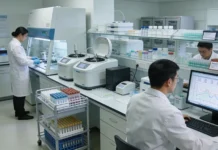Targeted cancer therapy has been transforming the care of patients with non-small-cell lung cancer (NSCLC). It is now standard practice for tumor specimens from NSCLC patients to be examined for EGFR mutations and ALK rearrangements to identify patients for therapy with EGFR and ALK inhibitors, respectively. Now, researchers say large-scale genomic testing is feasible within the clinical workflow, impacting therapeutic decisions. The study is published in the December 2012 issue of the International Association for the Study of Lung Cancer’s (IASLC) Journal of Thoracic Oncology.
Researchers from the Lowe Center for Thoracic Oncology at the Dana-Farber Cancer Institute, in conjunction with the Center for Advanced Molecular Diagnostics in the Pathology Department at the Brigham and Women’s Hospital and the Laboratory for Molecular Medicine at the Partners Healthcare Center for Personalized Genetic Medicine, introduced prospective geno¬typing of advanced NSCLC for somatic alterations in BRAF, HER2, PIK3CA, and ALK in July 2009, in addition to rou¬tine mutational analysis of EGFR and KRAS, which had been ongoing since 2004. Three-hundred forty-four specimens taken from 419 patients were successfully genotyped with a median turnaround time of 31 days.
“The goals of the genomic characterization of our NSCLC patients are to help guide therapy and ultimately lead to improved outcomes for those patients with specific genomic changes,” the authors say. “As the repertoire of muta¬tions for which targeted therapy may be offered expands in lung cancer and other solid malignancies, strategies to enable rapid, accurate and comprehensive clinical genotyping will be essential to successfully integrate tumor molecular analy¬sis into the fast pace of clinical decision making and yield its greatest potential impact on patient management.”

















